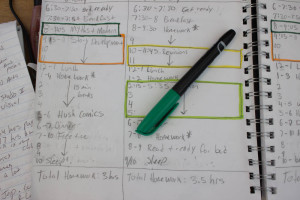Tags
Related Posts
Share This
Midterm Survival Guide
As midterm week hits, students are starting to panic. With art installations due, story revisions to slave over, lines to memorize and juries to prepare for life as a Jackalope can be extremely stressful. Even students taking the minimum amount of credits are in a frenzy. For those taking a heavy course load, exam weeks are a nightmare and it’s a wonder how they get through it without having a mental breakdown. Jackalope sat down with several students this week to ask them how they handle stress with a packed schedule. Here are some tips and tricks they had for not sinking under a mountain of homework and responsibility.
Tip #1: Schedule, schedule, schedule
One of the No. 1 tips students suggested when it comes to managing a heavy course load is to schedule everything out. At the beginning of each week, Senior Theater Design major Becca Spencer (18 credits) writes out everything she has to do that week day by day. “I live off a to-do list,” she says and checks off each item as she completes them. She also prioritizes her items from most important to least.
Freshman Creative Writing major Chantelle Mitchell (17 credits) schedules her time both in her physical planner and digitally on her computer, which then sends the information to her phone daily. This way she sees her schedule in two places, further ingraining it in her memory.
Senior and Student Voice President Rachel Shuford (18 credits) takes this one step further, scheduling out each day hour by hour.
“It’s really about carefully planning not only all of your events throughout the day but also planning out time in your schedule to complete assignments and study. I schedule everything in my planner including meals, sleep, mental recharge breaks etc.” By having a meticulous schedule, Shuford is able to manage her time effectively, never wasting a moment. Having a detailed schedule that you stick to is the number one most useful tool someone can have during their heavy course load frenzy.
Tip #2: Prioritize.
Along with scheduling daily assignments and activities, it’s important to prioritize one’s to-do list. There are some assignments that will take weeks to complete where others can be done the night before. It doesn’t make sense to focus on a half page reading response that’s not due until next week when you have a work-intensive installation piece due in a matter of days. When you prioritize your assignments, you can make the most out of your time doing the important things first.
The YouTube Channel “How To Adult” recently made a video titled “How to Do All the Things” in which entrepreneur and Internet celebrity Hank Green gave his advice for managing a busy lifestyle. Green is well-known for having a lot on his plate. He is the co-founder of DFTBA Records, Subbable, Vlogbrothers, Crash Course and SciShow, as well as the inventor of 2D Glasses and the executive producer of The Brain Scoop, The Lizzie Bennet Diaries, Emma Approved, Frankenstein MD, Sexplanations and How To Adult. Green believes prioritizing is vital to handling a busy schedule. His advice for doing this is simple: “Just let your brain do it. Just look at all the things that you have to do, consider each of them carefully and then do the one that your brain says ‘that one,’ even if you don’t know why.”
Part of prioritizing is the ability to say no. It might seem tempting to go out with friends the night before your term paper is due, but when taking on a heavy course load, you really have to put your school work ahead of these types of extracurriculars. You can always go out with your friends next weekend. Don’t let the fear of losing out on something keep you from passing your classes.
Tip #3: Take good care of yourself.
While it might be tempting to pull an all-nighter to study for an exam or cram down Hot Pockets for lunch in order to save time, it’s extremely important to take good care of yourself especially when you’re taking a heavy course load. Shuford makes sure to get at least six to eight hours of sleep each night and eats a balanced meal three times a day. “I’ve invested in the good kinds of ‘energy’ in vitamins, teas and green smoothies that give me an extra boost, while not making me crash like coffee sometimes does,” she says.
Family Therapist and Registered Nurse Mary C. Collins explains that “if you don’t eat every three to four hours your blood sugar gets so low that you can’t process information and you’re going to feel… faint and depressed so you’re not going to feel like doing any work.” Collins says the same is true for eating too much sugar. It’s all about finding a healthy balance.
If you have trouble fitting in time to eat a healthy meal, buying a to-go container from the Cafe might be a good investment. $5 will allow you to quickly gather up a meal then take it to your desk to eat while you work. Keeping healthy snacks in your room is also a good idea for when you don’t have time to go to the Cafe. There are also many healthy food subscription boxes that may be useful for those who either don’t have time to go grocery shopping or aren’t good at picking out healthy snacks for themselves. Services like “Love With Food” are a good option because they deliver organic, natural, and healthy snacks to you in the mail and only cost ten dollars a month. They also donate one meal to a local food bank for every box sold.
Relaxation and getting enough rest is important in taking care of yourself. Most of the students Jackalope interviewed agreed that taking time for yourself helps you recharge and not getting enough sleep makes you sluggish. “All-nighters are proven not to work!” says Collins and advocates strongly against them.
Exercising is also an important part of taking care of yourself. Studies show that regular exercise not only benefits the health of your heart but also helps your mood. Exercise releases endorphins, which trigger a positive feeling in your body. Collins says that exercising at least twice a week will take advantage of this effect. “Exercise causes blood to rush through all your organs and affects how you process food. It also carries oxygen to the brain. If you don’t exercise, your circulation stays stagnant and can’t do its job,” she says.
Driscoll Fitness Center Manager Ron Nunnelly notes that “exercise and fitness relieves a lot of stress,” and finds that a lot of students come to the center during the first and last three weeks of each semester to blow off steam. The fitness center has a lot of different services available to students.
“You can do cardio, bicycles, lift weights and if you’re not into exercise, we have an Xbox with Dance games. We have a lot of options in the gym,” says Nunnelly. There are also yoga classes available Tuesdays with power yoga from 3:30pm to 4:15pm and relaxation yoga from 4:15pm to 5pm. “We have about 150 students that visit the center every day.”
Tip #4 Plan for things to go wrong. Be kind to yourself when they do.
An important thing to remember when taking a heavy course load is that you’re only human. Things are going fall apart sometimes. You’re going to get sick and miss class. People are going to do things that inconvenience you. You’re bound to have days where you just don’t have time to get everything done. Don’t beat yourself up when these things happen, but plan ahead of time in case things go wrong.
Leave free time in your schedule that you can fall back on when your friend is in crisis and you have to be a shoulder to cry on. Get enough sleep so that if you have to wake up early one day to get homework done, you’re not absolutely exhausted. The author of this article is also taking 18 credits and always makes sure to leave an hour or two buffer between classes and assignments to fall back on when things take a turn for the worse. By having this extra time I am able to be flexible with my schedule and in the event something terrible doesn’t happen, I get to indulge in little extra one on one time with Netflix.
Always be kind to yourself when things take a turn for the worse. Self-hatred isn’t going to make the problem go away and will wind up making your ability to handle a busy schedule much harder. Green compares it to being at the top of a cliff. “When you’re at the top of the cliff, don’t look down,” he suggests. “Do not think about everything you need to get done. If you try and think about all the different tasks, you’ll never be able to motivate yourself to do it… Take it one little task at a time. Just climb down the cliff and never look at how long it is. You can’t eat a pizza in one bite, friends.”
I personally use a mantra to help myself get through some of my freak out moments. Mine is DFTBA (Don’t Forget to Be Awesome) which I got tattooed on my wrist before taking on this insane, 18-credit adventure. Yours should be something that reminds you that you can get through the rough patches. Remember that you can get through them.
Tip #5: Don’t be afraid to do things outside of class. Have fun!
It might seem like you’ll never have time to do anything but homework, eating and sleeping, but that’s not necessarily the case. You can’t constantly be doing homework or you’ll likely burn out. All the students Jackalope talked to had other activities they participated in outside of their school work. “Outside of class I’m in a production called For Colored Girls, I work in the mailroom, I’m on the production team for the Ten Minute Theatre festival and I’m the president of the Japanese Cultural Collective,” says Mitchell, who forgot to mention she is also on the Student Programming Board.
Freshman Digital Illustration major Brenda Lemieux (18 credits), is also part of the Japanese Cultural Collective and Student Programming Board, as well as the League of Legends Club. She also works 17 hours a week at the restaurant “Dion’s.” Even with all this work she still has time to hang out with her friends and do her own art projects outside of class.
College is a lot more than tests and assignments. This is a point in your life where you’re free to try new things and meet new people. Don’t think you have to spend every waking moment on homework just because you took a lot of classes. If you structure your time efficiently, you can do a lot more than just homework.
Taking a heavy course can be stressful and it isn’t for every student. Some students who attempt a full schedule end up having to drop a class and end up with a W on their transcript. Having one or two W on your transcript isn’t the end of the world and SFUAD academic counselors agree that it probably won’t affect Graduate school applications. You don’t have to be the best student in the world to succeed. If you use your time wisely, take care of yourself, and give yourself permission to goof off once and a while, taking a lot of classes is completely doable.











 Jackalope Magazine is the student magazine of Santa Fe University of Art and Design. Building on the interdisciplinary nature of our education, we aim to showcase the talent of our university and character of our city.
Jackalope Magazine is the student magazine of Santa Fe University of Art and Design. Building on the interdisciplinary nature of our education, we aim to showcase the talent of our university and character of our city.
Recent Comments